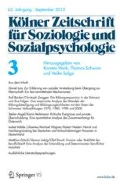Zusammenfassung
Soziale Einflüsse auf die Klassenwahl wirken sich als höhere Wahrscheinlichkeit zur SPD-Wahl bei Arbeitern in klassenhomogenen Umwelten aus. Diese Umwelten sind als ego-zentrierte Netzwerke erfassbar. Dieser Einfluss ist nur noch für ältere Wählerkohorten und frühere Bundestagswahlen nachweisbar. Dieses Ergebnis wird ergänzt um ein dynamisches Einflussmodell, das die Beziehung zwischen der dauerhafteren Parteiidentifikation und der aktuellen Wahlabsicht thematisiert. Danach werden Arbeiter, die nicht Anhänger einer Partei sind, von Arbeiterkontakten in Wahlkampfzeiten zur SPD-Wahl motiviert. Mit den ALLBUS-Umfragen für 1980, 1990 und 2000, deren Feldarbeit nicht zu Wahlkampfzeiten stattfand, ist dieser Effekt nicht nachweisbar. Was sich im Zeitverlauf nicht verändert hat, ist die schwerpunktmäßige Rekrutierung der Freunde und Bekannten aus derselben Schicht und die Verstärkung der subjektiven Schichtidentifikation durch die entsprechenden schichthomogenen Kontakte. Allgemein ausgedrückt: Die Politisierung der Sozialstruktur hat abgenommen, der Einfluss der Sozialstruktur auf die Alltagsinteraktionen der Wählerschaft ist geblieben.
Abstract
Social influences on the class vote result in a higher SPD-vote of workers who live in class homogeneous environments. These environments can be operationalized as ego-centric networks. In West Germany, these social influences are restricted to older cohorts and earlier Bundestag elections. This result gets corroborated by applying a more sophisticated dynamic version of an influence model, which analyses the relationship between party identification and the vote intention. It is shown that workers who do not identify with a party get mobilized as SPD-voters during election campaigns if they have contacts with other workers. This effect cannot be observed with ALLBUS-data from 1980, 1990 and 2000 for which interviewing did not take place during election campaigns. What has not changed in the last decades is the recruitment of friends and acquaintances from the same social class and subjective class identification under the impact of class homogeneous networks. What has changed is the politisation of these class homogeneous networks.
Literatur
Berelson , Bernard R. / Lazarsfeld , Paul F. / McPhee , William, 1954: Voting. Chicago und London: University of Chicago Press.
Elff , Martin, 2006: Politische Ideologien, soziale Konflikte und Wahlverhalten. Baden-Baden: Nomos.
Elff , Martin, 2007: Social Structure and Electoral Behavior in Comparative Perspective: The Decline of Social Cleavages in Western Europe Revisited, in: Perspectives on Politics 5, 277-294.
Huckfeldt , Robert/Ikeda , Ken’ichi / Pappi , Franz U., 2005: Patterns of Disagreement in Democratic Politics: Comparing Germany, Japan, and the United States, in: American Journal of Political Science 49, 497-514.
Huckfeldt , Robert / Johnson , Paul E. / Sprague , John, 2004: Political Disagreement. The Survival of Diverse Opinions within Communication Networks. Cambridge: Cambridge University Press.
Huckfeldt , Robert / Sprague , John, 1995: Citizens, Politics, and Social Communication. Information and Influence in an Election Campaign. Cambridge: Cambridge University Press.
Klein , Markus, 2007: Individuelles Wählerverhalten und sozialer Kontext: Logistische Mehrebenenanalysen der Wahlentscheidung bei den Bundestagswahlen 1994, 1998 und 2002, in: Rattinger , Hans / Gabriel , Oscar W. / Falter , Jürgen W. (Hrsg.), Der gesamtdeutsche Wähler. Baden-Baden: Nomos, 235-249.
Knoke , David, 1990: Political Networks. The Structural Perspective. Cambridge: Cambridge University Press.
Kohler , Ulrich, 2005: Changing Class Locations and Partisanship in Germany, in: Zuckerman , Alan S. (Hrsg.), The Social Logic of Politics. Personal Networks as Contexts for Political Behavior. Philadelphia: Temple University Press, 117-131.
Kohler , Ulrich, 2002: Der demokratische Klassenkampf. Zum Zusammenhang von Sozialstruktur und Parteipräferenz. Frankfurt a. M./New York: Campus.
Lazarsfeld , Paul F. / Berelson , Bernard / Gaudet , Hazel, 1968 (1944): The People’s Choice: How the Voter Makes up His Mind in a Presidential Election. New York und London: Columbia University Press.
Marx , Karl, 1965: Der Achzehnte Brumaire des Louis Bonaparte. Berlin: Dietz.
Pappi , Franz Urban, 2002: Die politisierte Sozialstruktur heute: Historische Reminiszenz oder aktuelles Erklärungspotential?, in: Brettschneider , Frank / Deth , Jan W. van / Roller , Edeltraud (Hrsg.), Das Ende der politisierten Sozialstruktur? Opladen: Leske + Budrich, 25-46.
Pappi , Franz Urban, 2001: Soziale Netzwerke, in: Schäfers , Bernhard / Zapf , Wolfgang (Hrsg.), Handwörterbuch zur Gesellschaft Deutschlands. 2. Aufl. Opladen: Leske + Budrich, 605-616.
Pappi , Franz Urban, 1977: Sozialstruktur und politische Konflikte in der Bundesrepublik. Habilitationsschrift. Köln: Wirtschafts- und Sozialwissenschaftliche Fakultät der Universität zu Köln.
Pappi , Franz U r ban / Mnich , Peter , 1992: The Federal Republic of Germany, in: Franklin , Mark N. / Mackie , Thomas T. / Valen , Henry et al. (Hrsg.), Electoral Change: Responses to Evolving Social and Attitudinal Structures in Western Countries. Cambridge: Cambridge University Press, 179-204.
Pappi , Franz Urban / Shikano , Susumu, 2007: Wahl- und Wählerforschung. Baden-Baden: Nomos.
Tingsten , Herbert, 1937: Political Behavior: Studies in Election Statistics. London: P.S. King & Son, Ltd.
Zuckerman , Alan S. (Hrsg.), 2005: The Social Logic of Politics. Personal Networks as Contexts for Political Behavior. Philadelphia: Temple University Press.
Zuckerman, Alan S. / Valentino , Nicholas A. / Zuckerman, Ezra W. , 1994: A Structural Theory of Vote Choice: Social and Political Networks and Electoral Flows in Britain and the United States, in: The Journal of Politics 56, 1008-1033.
Author information
Authors and Affiliations
Corresponding author
Additional information
*Wir bedanken uns bei den anonymen Gutachtern für ihre konstruktive Kritik. Sie hat zu wesentlichen Verbesserungen geführt. Verbleibende Schwächen gehen voll zu Lasten der Autoren. Bei Marcus Ohl bedanken wir uns für Hilfe bei der Datenaufbereitung.
Rights and permissions
About this article
Cite this article
Pappi, F., Brandenburg, J. Soziale Einflüsse auf die Klassenwahl im Generationen- und Periodenvergleich:. Koelner Z.Soziol.u.Soz.Psychol 60, 457–472 (2008). https://doi.org/10.1007/s11577-008-0023-8
Published:
Issue Date:
DOI: https://doi.org/10.1007/s11577-008-0023-8

